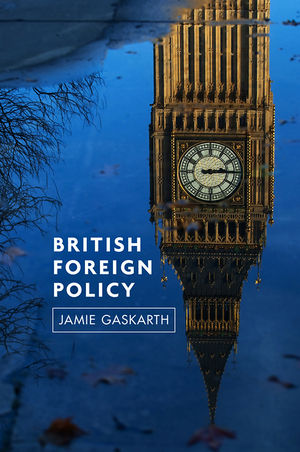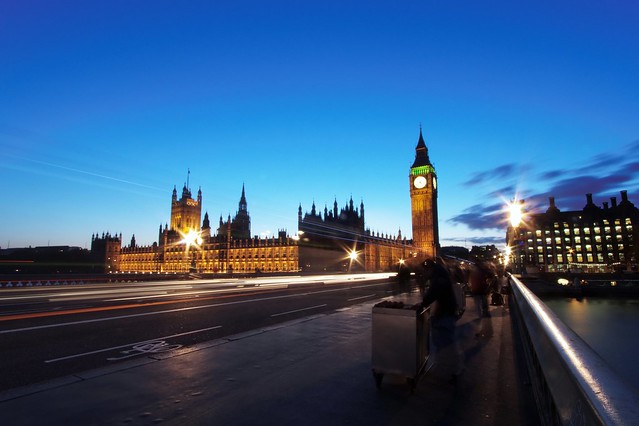 Britain has been a significant voice in global politics in the last two decades and its impact on world events far outweighs its material resources. But how does a small island on the edge of Europe continue to exercise this level of power on an international scale? What future challenges will confront British foreign policymakers in a multi–polar world of emerging powers? In this comprehensive introduction to British foreign policy today Jamie Gaskarth aims to address these and other key questions. It is a witty and up-to-date account of the inner workings of the policymaking process in this country, writes James Strong.
Britain has been a significant voice in global politics in the last two decades and its impact on world events far outweighs its material resources. But how does a small island on the edge of Europe continue to exercise this level of power on an international scale? What future challenges will confront British foreign policymakers in a multi–polar world of emerging powers? In this comprehensive introduction to British foreign policy today Jamie Gaskarth aims to address these and other key questions. It is a witty and up-to-date account of the inner workings of the policymaking process in this country, writes James Strong.
 British Foreign Policy: Crises, Conflicts and Future Challenges. Jamie Gaskarth. Polity Press. April 2013.
British Foreign Policy: Crises, Conflicts and Future Challenges. Jamie Gaskarth. Polity Press. April 2013.
Jamie Gaskarth has produced an excellent introduction to the study of British foreign policy. Laced with wit and illustrated throughout by well-chosen analytic case studies, his text both presents an up-to-date account of the actors, organisations, processes, and ideas at work in the foreign policymaking process in this country, and highlights three main issue areas affecting how Britain engages with the international arena today.
The opening chapter sets up the book’s underlying message: foreign policy analysis is a crucial part of the broader International Relations literature, and Britain remains a sufficiently important global actor to warrant study in its own right. Gaskarth makes clear his will be an interpretive account, concerned with ideas as the source of identity and interests, but commits also to basing his argument on detailed empirical analysis. He assumes that states remain the primary actors in international politics, and that the state retains enough control over its interactions with the outside world to justify a state-centric focus. This is not a hard-line stance. While Gaskarth maintains that crucial aspects of the foreign policymaking process, in Britain as elsewhere, depend on ideational more than material factors, he does not deny that the material world exists.
Chapter 2 reviews the actors who make up the British foreign policymaking system. For the first-time student of Britain as an international actor, this chapter will be essential reading. It offers a comprehensive and highly detailed survey, based on interviews with serving and former ministers and officials, as well as documentary research. It serves as an effective and well-balanced dramatis personae to set up the broader discussion.
Gaskarth then goes on to discusses how British foreign policy is made. He maintains that general models of foreign policymaking fall down in their empirical application because actual practice is so ad hoc, and because most were developed to explain behaviour in the United States, an idiosyncratic system when compared to much of the rest of the world. He argues that foreign policymaking must be seen in terms of its governmentality and governance, in other words, as a practice of government and governments not as a model to be followed. Establishing a pattern repeated through much of the book, Gaskarth introduces three middle-range theories from the wider literature alleged to explain foreign policymaking (here the Westminster, differentiated polity, and asymmetric power models), reviews each in turn, then settles in favour of the third model, a hybrid of the former two.

Chapters 4 and 5 broadly consider how Britain imagines itself as a foreign policy actor, and how this self-identity is affected by contact and comparison with other states in the international arena. Historical, geographical, and ethical factors matter, according to Gaskarth, and it is difficult to argue with his ambiguous conclusion on the question of what kind of power is Britain. Still clearly so powerful in many ways, the British often have little idea themselves.
Chapters 6, 7 and 8 review the ethical, military, and economic aspects of British foreign policy, on the basis that these three issue areas appear the most prominent on policymakers’ present agendas. Gaskarth highlights the inevitability of ethical dilemma in foreign policy, noting that most major decisions promise positive and negative ethical consequences. He observes the central importance of ideas of status to decisions about Britain’s military role in the world, highlighting through an excellent case study of the Fourth Afghan War (2001 – present) the worrying growth of a disconnect between politicians’ ambitions and the military’s material strength. In the economic field, Gaskarth’s Britain remains a global player, capable even of leadership in the G20 thanks to its wealth, continued economic strength, and trading heritage, though he is not naive enough to assume this position must last.
Gaskarth throughout makes good use of signposting and short in-text summary sections to highlight key points and structure the text, underlining his work’s utility as a teaching aid. This practice, however, highlights his work’s main shortcoming. It is unclear whether he intended it as an introductory text, or a work for the specialist reader. Its introductory tone and straightforward structure suggest the former; the extent of the original research it encompasses suggests the latter. Perhaps aping the actual conduct of British foreign policy, Gaskarth refuses to present a central theory to underpin his empirical work. Instead he emphasises (and adopts) the FCO’s traditional pragmatic attitude, preferring the ‘middle way’ whenever available, and refusing to regress his analysis towards some imagined mean of standard policymaking practice. This makes his work more realistic. But any reader seeking generalisable principles, or a timeless guide to British foreign policy’s essentials, will be disappointed. For Gaskarth, this is simply not that kind of subject. For the reader, his text is simply not that kind of book.
—————————————————————————
Dr James Strong is a Fellow in the Department of International Relations at the LSE. He blogs at drjamesstrong.wordpress.com and tweets from @Dr_James_Strong. Read more reviews by James.








2 Comments